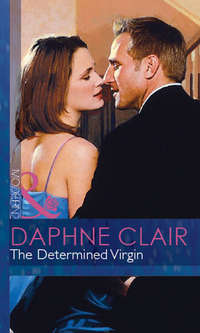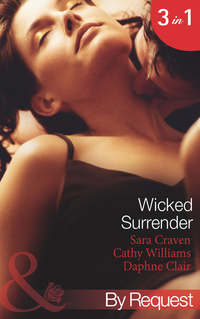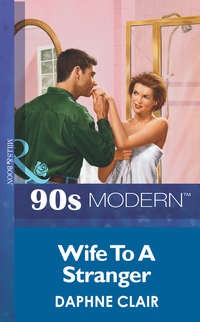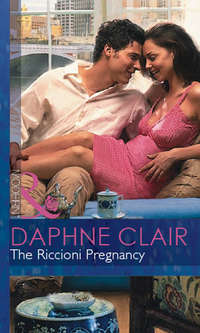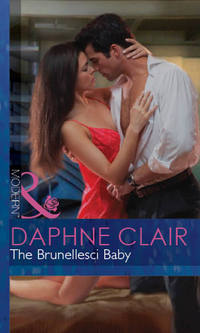
Полная версия
Summer Seduction
‘I haven’t read a lot of psychology,’ Blythe confessed. ‘But it seems plain common sense to me.’
He smiled suddenly, almost indulgently, his eyes warming in a way that made her heart skip a beat. ‘And you have a lot of that.’
Blythe hoped it was a compliment.
When they reached the sandy flight of steps to the cottage Jas made to hand over Blythe’s fish.
‘Come in,’ she said, ‘and let me see to your hand.’
‘There’s nothing wrong with it—’
‘Yes, there is. And I feel responsible.’ She gripped his wrist. ‘Come on.’
He could have pulled away, but instead he followed her up to the cottage, depositing the fish on the porch, and let Blythe lead him to the bathroom and switch on the light. She inspected his hand. ‘That needs cleaning.’
She ran warm water into the basin and poured in a little disinfectant. But when she made to clean the wound, Jas firmly removed the cloth from her hand and did the job himself.
Blythe found a clean towel and gently blotted the water from his palm, then placed a piece of gauze over it. As she leaned forward to tape it with sticking plaster she felt his breath stir the tendrils of hair at her temples. But there was a resistance emanating from him, as though he hated her touching him.
Not a touchy-feely person, she thought, concentrating on her task.
As soon as she’d finished he stepped back, although there wasn’t much room. ‘I hope your conscience feels better now,’ he said, a touch of irony in his voice.
‘You’re going to have trouble making a meal. Why don’t I cook some of the fish, and we can eat together?’
‘Here? You’ve had a busy day—’
‘I have to have dinner anyway.’
After a moment he said, ‘All right. Use my fish, and you can put yours in the freezer.’
She let him get the table ready, and while she prepared the meal he sat on the sofa and looked through a pile of library books she’d left on the coffee table—a book on contemporary Maori art, a romantic novel, a thriller and a biography of the painter Raphael.
‘You have an eclectic taste,’ he commented.
‘I like variety.’
‘Mm. So I see.’
In a very short time she’d served them fillets dribbled with lemon-and-parsley butter and accompanied by new potatoes and a fresh salad.
‘That was very good.’ Jas pushed away his plate.
‘There’s nothing like fish straight from the sea. Do you want a pudding? I can open a can of peaches—’
‘No. Thank you.’
‘Coffee, then.’ Blythe got up to clear the plates.
When she put the cups on the coffee table he moved to the sofa beside her. The cup she’d given him was a hexagon, in alternating bands of green china and shining gold. He turned it interestedly, examining the pattern.
‘That was my grandmother’s,’ she said.
‘Tell me about her.’
She looked at him sceptically.
‘I never knew my grandparents,’ he said. ‘Was she like you? Do you take after her?’
‘Well…she was very independent…’
‘A family trait. And…?’
Beginning hesitantly, she soon launched into family memories, watching his face for signs of boredom. He slipped in occasional questions, and listened with an expression of alert curiosity, like a tourist in a foreign land, curious about the local way of life.
At last she said, ‘It’s a shame you didn’t know your grandparents. They must have died early?’
‘My mother’s parents did, and I think my father just lost touch with his.’
‘That’s sad. Do you have brothers and sisters?’
He put down his cup. ‘I had two half-brothers,’ he said rather curtly. ‘I haven’t seen them in years.’
‘Why?’ Her eyes rounded with sympathy.
‘We didn’t like each other much.’ He picked up the Raphael biography and started leafing through it. ‘You’re interested in Raphael’s work?’
Reluctantly, Blythe dropped the subject of his family. ‘Art history was my best subject at school.’
‘Why didn’t you go to university?’
‘I wasn’t sure what I wanted to do, and I was offered a job at the nursery where I’d worked in the school holidays. I’d enjoyed that, so I took it.’
Jas paused at a page, and Blythe leaned forward a little to see what had captured his attention. The illustration was a round design divided symmetrically into panels painted with different designs. She read the caption aloud. ‘“The Cupola of the Chigi chapel.”’
‘It’s an intriguing pattern.’
Blythe shifted closer to see, her shoulder brushing against his. ‘It must have taken ages,’ she murmured. ‘And think what a crick in the neck he’d have had!’
Jas’s laughter stirred her hair, and she turned to smile at him.
His face was only inches from hers, the laughter in his eyes making them softer, darker, and his mouth curved, creasing his cheeks. For once he looked relaxed and happy, but almost immediately his head went back, his eyes leaving hers and returning to the book in his hands.
He closed it with a snap, and replaced it carefully on the table. Then he stood up. ‘Time I left,’ he said, although it was still quite early. ‘Many thanks for the dinner and coffee. Can I help with the dishes?’ He glanced down at the dressing on his hand. ‘I could dry.’
Blythe shook her head. ‘There’s not much. Don’t worry about it.’ If he wanted to go she wasn’t going to make excuses to hold him. She followed him to the door, and watched him descend the steps to the road, and then he lifted a hand and walked away.
* * *
Blythe couldn’t have said Jas was an intrusive neighbour. In turn she tried to respect his preference for privacy. Sometimes over the next few weeks they found themselves on the beach together and ended up strolling side by side. He watched her pick hare’s-tails and dry grasses and gather up the spiny heads of spinifex blowing along the sand, and helped her sift through the sea-wrack left by the tide, hunting for its hidden treasures. Occasionally he arrived at her door with a piece of driftwood or a bit of sea-worn glass that he thought she might like for her notions.
She had less time for them now. The bigger sunflowers in the open ground were ready for picking, and she had to watch for the right moment, just before the flowers burst from their buds, to harvest them and get them to her markets in Auckland.
One overcast and rain-misted day, Jas knocked on her door.
He held a bundle of envelopes and a large parcel. The clouds had parted on a sliver of blue behind him, but his hair was hazed with tiny droplets of moisture. ‘Your mail,’ he said. ‘Doug said you might want the parcel.’
‘Oh, thanks!’ A paintbrush in one hand, Blythe took the envelopes from him and stepped back. ‘That’ll be some craft books I ordered. Come in.’
She thought he was going to refuse, but he looked at the paintbrush she held and stepped inside.
‘Where do you want this?’
‘On the table,’ she said, hastily clearing a space among paints and flowerpots.
He put down the carton and straightened, glancing at the pots she’d decorated with brightly hued patterns—dots, stripes and wavy lines, even bows.
‘What do you think?’ she asked him.
‘Very colourful.’
‘I thought plain green pots were a bit boring. The next batch of dwarfs I’m going to slip into these. D’you think they’ll sell?’
‘I’m not qualified to say.’
‘Well, put it this way—would you buy one? With a sunflower in it?’
He picked up one of the pots by the rim, away from the wet paint. She had painted a bright yellow floppy bow on it, with red polka dots. ‘I might have…once. Yes.’ His voice had deepened, and the skin over his cheekbones seemed to tauten as he swallowed. ‘I’m sure they’ll sell.’
Blythe put her paintbrush down, reaching across beside him to place it in a jar of water, giving him a little time.
When he replaced the pot and lifted his head she looked at him searchingly but his face gave nothing away.
Then he smiled, a tiny movement of his firm lips. ‘You’ve got a bit of paint on your cheek.’
‘Damn, where?’ She picked up a paint-stained cloth.
Jas took it from her and gently rubbed at her skin.
Their eyes met and she gazed at him curiously, seeing her own trustingly upturned face reflected in the dark centres as he looked back at her. His hand had stilled and she was conscious of his thumb resting against her cheekbone.
His eyelids lowered, his narrowed gaze lingering on the soft, involuntary parting of her lips before he stepped back. ‘There.’ He put the cloth down.
Blythe stood for a moment, savouring a strange, bubbling delight. ‘Stay for coffee?’
‘You’re working.’
He hadn’t turned her down flat. ‘Time I took a break.’ She moved to put on the kettle. ‘Want a biscuit?’
‘Have you made some?’
‘I’m afraid these are out of a packet.’ She shook out a circle of ginger biscuits onto a plate.
He watched while she prepared the two coffees and added sugar into his, a splash of milk to her own. She had the feeling he was keeping his mind off something.
‘The sun’s come out!’ she said, turning to the sliding glass doors. ‘We could sit on the deck.’
Jas followed her gaze, then looked back at her. ‘So it has.’
‘Can you put a couple of folding chairs out for us? They’re hidden behind the curtain.’
Jas set up the canvas chairs and took his cup from her, and she placed the biscuits on the low wooden table, still damp from the rain.
The sea was deep blue, stippled with white; a few clouds hung raggedly above it. The wet leaves of the nearby trees were glossily shining in the sun.
Blythe breathed in the metallic after-rain smell, stole a look at Jas’s hard profile, then sipped at her coffee, cradling the cup in both hands. ‘I’m investigating other uses for sunflowers and lavender. Did you know you can make paper from sunflower stalks and dyes from the petals?’
‘Are you planning on making paper?’
‘Maybe. What do you think of handmade swing tags with my name on, attached to every pot or notion?’
‘Sounds good. What do you call yourself?’
‘Just B. Summerfield.’
‘Shouldn’t you use a catchy trade name like…Blythe Blooms or…Summers Fields?’
‘You could be right,’ Blythe said. ‘It didn’t seem to matter when my main business was selling dried flowers to florists. But since the notions took off, and now the potted sunflowers…Blythe Blooms.’ She gave him a delighted look. ‘I like it. I wonder if I should advertise for mail orders and sell direct to the public?’
‘Why not?’
‘I’ll have fun trying it out, anyway.’
‘I’ve no doubt you will.’
Blythe bit her lip. She’d been sounding as if life were a game.
‘What’s the matter?’ Jas asked.
‘You think I’m a lightweight person, don’t you? With no…depth.’
Jas’s brows lifted. ‘I think you’re a lucky person,’ he said slowly, ‘who’s been loved and cherished all her life. Also a hardworking one, and probably too kind-hearted for your own good.’
It wasn’t an unflattering assessment, but it didn’t contradict her original assertion, either. ‘Weren’t you ever loved and cherished?’
Jas didn’t react for a moment. ‘You’re getting into deep waters. I wouldn’t advise you to go any further.’
Blythe flushed. ‘I had no right to say that. But you started it…’
‘You asked.’
So she had. ‘I’m sorry.’
He seemed to be thinking, staring at the limitless view before them. ‘I appreciate your concern, Blythe,’ he said at last. ‘Only I can’t…satisfy your need to nurture. Keep that for your plants.’
CHAPTER THREE
HE WAS letting her down lightly. But at the same time leaving her in no doubt that he didn’t want her prying into his life.
With a small flash of temper, she said, ‘You needn’t patronise me!’
‘I wasn’t. Not intentionally.’ He glanced at the cup in his hand. ‘Have I outstayed my welcome?’
‘No, of course not. Finish your coffee.’ She pushed the plate of gingernuts towards him.
He inclined his head, and reached for a biscuit.
Blythe too picked up a biscuit and nibbled it in silence. A breeze dipped over the hill and ruffled the tops of the trees. The clouds were drifting away, leaving more blue sky in their wake. The silvery, moving mass of the sea, breaking into long, uneven rollers near the shore, seemed to absorb all of Jas’s attention.
‘You have a wider view than I do,’ he commented at last. ‘But you must be pretty exposed.’
‘It depends on which way the wind is blowing. If it’s coming straight off the sea it can get pretty fierce. But I enjoy storms.’
He looked at her again. ‘They can be destructive.’
‘Well, you can’t stop a storm from coming.’
‘So you might as well get some pleasure from it?’
‘Is there anything wrong with that?’
‘Nothing at all.’ For a few seconds longer he studied her, his gaze a little amused, a little speculative. Then abruptly he turned away. ‘Don’t you worry about your plants?’
‘Of course. I give them good supports and protect them as best I can.’
Jas nodded, as though he was thinking of something else. He finished his coffee and refused another cup. ‘I’ve kept you from your work long enough.’ He stood up.
‘And you have work to do too,’ she guessed, thinking of the computer and the room set up as a study with books, folders and papers. She rose too, looking at him curiously as they moved inside. ‘But you’re not teaching at the moment, are you?’
‘My students study by correspondence.’
She hadn’t thought of that. ‘Music?’ Could people study music by mail?
‘Not music.’ He seemed to be debating whether to expand on that, but as she continued to gaze at him enquiringly he finally said, ‘Mathematics.’
Blythe grimaced. ‘Maths!’
‘Pure mathematics,’ he expanded, and added dryly, ‘It tends to be a conversation-stopper.’
Yes, it would be. Was that why he hadn’t volunteered the information before? ‘Maths was my worst subject at school,’ she confessed.
‘You’re not alone, but you probably mean arithmetic. Pure mathematics deals with puzzles and patterns and universal forms. It’s full of mystery and magic.’
Blythe blinked disbelievingly. ‘Magic?’
‘Throughout the ages numbers have been recognised as mystical. Pythagoras founded a secret society dedicated to their study and worship.’
‘They worshipped numbers?’
‘Uh-huh.’
‘Do you?’ She slanted him a questioning smile.
‘They fascinate me.’ His eyes were alight and very green. He glanced at the nets above them, laden with colour. ‘You might appreciate a comparison made by a mathematician called Barry Mazur, who says that number theory effortlessly produces innumerable problems which have a sweet, innocent air about them—like tempting flowers.’
‘Flowers?’
‘Mm-hmm.’ The smile in Jas’s eyes deepened, and she felt her heart give an odd little skip. ‘He also says that it swarms with bugs waiting to bite the flowerlovers who, once bitten, are inspired to excesses of effort.’
‘Flowers,’ Blythe repeated. ‘I suppose,’ she said doubtfully, ‘bugs do inspire extra effort in getting rid of them to preserve the flowers.’
‘And now you know what a party-pooper a mathematician can be! I really am leaving.’
Halfway to Apiata the following Monday, Blythe came upon Jas’s car, the hood raised while he inspected the engine. She drew up beside him. ‘Can I help?’
Jas straightened. ‘Only if you have spare parts for this thing. I think there’s a crack in the carburettor.’
‘I could give you a lift to Tau’s garage at Apiata.’
‘Thanks, that would be very helpful. Just a minute.’ He opened the door of the station wagon and brought out his laptop computer and a portable printer, then climbed into the van beside her.
‘Do you go everywhere with those?’ Blythe enquired curiously. He was wise to remove them from the car before he left it, but she didn’t think he’d need to worry about his house being burgled.
Конец ознакомительного фрагмента.
Текст предоставлен ООО «ЛитРес».
Прочитайте эту книгу целиком, купив полную легальную версию на ЛитРес.
Безопасно оплатить книгу можно банковской картой Visa, MasterCard, Maestro, со счета мобильного телефона, с платежного терминала, в салоне МТС или Связной, через PayPal, WebMoney, Яндекс.Деньги, QIWI Кошелек, бонусными картами или другим удобным Вам способом.





